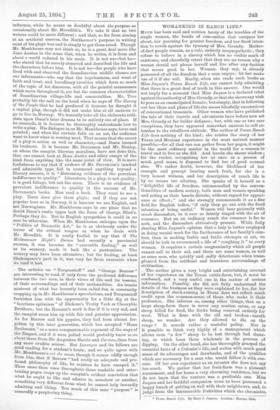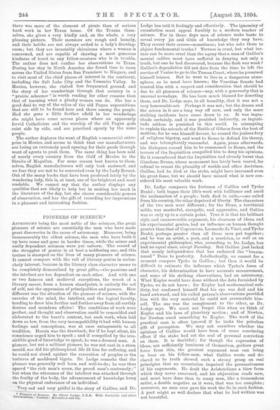WOMANKIND IN RANCH LIFE.* Maros has been said and written
lately of the troubles of the single woman, the bonds of convention that compass her about, her yearning for greater freedom, and her fixed inten- tion to revolt against the tyranny of Mrs. Grundy. Matter- of-fact people remain, as a rule, entirely unsympathetic ; they refuse to believe in a slavery which has no visible mark of existence, and cheerfully retort that they see no reason why a woman should not please herself and live after any fashion that seems good to her. Woman, they say, is already possessed of all the freedom that a man enjoys ; let her make use of it if she will. Really, when one reads such books as Miss Jaques's Texan Ranch Life, one cannot help admitting that there is a great deal of truth in this answer. One would not imply for a moment that Miss Jaques is a declared rebel against the authority of Mrs. Grundy, or that she shows any wish to pose as an emancipated female; but simply, that in following out her ideas and plans of life she seems blissfully unconscious of conventional trammels. Other women who have published the tale of their travels and adventures have before now set Mrs. Grundy at far bolder defiance ; but, with one or two rare exceptions, they have appeared somewhat anxious to call at- tention to the rebellious attitude. The author of Texan Ranch Life does nothing of the kind ; she relates the story of her Texan and Mexican experience in the most natural manner possible,—for all that one can gather from her pages, it might be the most ordinary matter in the world for a woman to travel and to live as she did. And herein she shows wisdom; for the reader, recognising her at once as a person of much good sense, is disposed to find her of good counsel also. We rather doubt, however, the likelihood of her example and precept bearing much fruit, for she is a very honest witness, and her description of ranch life is by no means too alluring. She speaks of it herself as a. "delightful life of freedom, untrammelled by the conven- tionalities of modern society, both men and women speaking and acting as their hearts dictate, without regard for appear- same or effect ; " and she strongly recommends it as a fine field for English ladies, "if only they go out with the fixed intention of being useful." Women will bear patiently with much discomfort, be it ever so faintly tinged with the air of romance. But on an ordinary ranch the romance is fax to seek, and the discomfort obtrusively present. While fully sharing Miss Jaques's opinion that a lady is better employed in doing menial work for the furtherance of her family's com- fort, than in making feeble and futile attempts at art, we, should be loth to recommend a life of " roughing it " to every woman. It requires a certain magnanimity which all people cannot call to their aid, and there are some women, as well as some men, who quickly and sadly deteriorate when trans- planted from the artificial and luxurious surroundings of civilisation.
The author gives a very bright and entertaining acoonnb of her experience on the Texan cattle-farm, but, it must be confessed, not a very useful one in the matter of serious information. Possibly she did not fully understand the details of the business as they were explained to her, for her description of stock-raising in Texas does not reflect much credit upon the common-sense of those who make it their profession. She informs us, among other things, that on a large sheep-farm there is never any mutton eaten, or any sheep killed for food, the flocks being reserved entirely for wool. What is done with the old and broken - mouth sheep, we wonder. Are they allowed to die on the range ? It sounds rather a wasteful policy. Nor is it possible to think very highly of a management which allows even "a few" sheep to be lost through bad shear. ing, or which loses them wholesale in the process of dipping. On the other hand, she has thoroughly grasped the essential facts of a Colonist's life, and writes with much good sense of its advantages and drawbacks, and of the qualities which are necessary for a man who would follow it with sue- cess. Of her own experience as an investor she does not any too much. We gather that her fruit-farm was a pleasant amusement, and her home a very charming residence, but we do not learn that the venture was a profitable one. Misa Jaques and her faithful companion seem to have possessed a happy knack of getting on. well with their neighbours, and, to judge from the innumerable festivities which she chronicles, Toman Ranch Life. IIy Mary J. Jaquoa. Loudon : boraao Cox. there was more of the element of picnic than of serious hard work in her Texan home. Of the Texans them- selves, she gives a very kindly and, on the whole, a very pleasing picture. Their manners are rough and homely, and their habits are not always suited to a lady's drawing. room ; but they are invariably chivalrous where a woman is concerned, and are capable of showing a most generous kindness of heart to any fellow-creature who is in trouble. The author does not confine her observations to Texas. During her stay in North America she found time to roam across the United States from San Francisco to Niagara, and to visit most of the chief places of interest in the continent, including the Salt Lake City and the Yosemite Valley. In Mexico, however, she visited less frequented ground, and the story of her wanderings through that country in a "prairie schooner" is worth reading for other reasons than that of learning what a plucky woman can do. She has a good deal to say of the relics of the old Pagan superstitions that are still to be found here and there among the people. Had she gone a little further afield in her wanderings she might have come across places where an apparently fervid Catholicism and the worship of the old Pagan gods exist side by aide, and are practised openly by the same people.
The author deplores the want of English commercial enter- prise in Mexico, and seems to think that our manufacturers are losing an extremely good opening for their goods through want of agents to push them. The same thing bee been said of nearly every country from the Gulf of Mexico to the Straits of Magellan. For some reason best known to them. selves, English manufacturers will only look eastward, and we fear they are not to be converted even by the Lady Errant. Out of the many books that have been produced lately by the wandering lady, this is, at least, one of the brightest and most readable. We cannot say that the author displays any qualities that are likely to help her in making her mark in the literature of the day, but she shows considerable powers of observation, and has the gift of recording her impressions in a pleasant and interesting fashion.

































 Previous page
Previous page